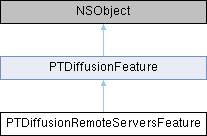 |
Diffusion Apple API 6.12.0
Unified Client Library for iOS, tvOS and OS X / macOS
|
 |
Diffusion Apple API 6.12.0
Unified Client Library for iOS, tvOS and OS X / macOS
|
This feature allows a client session to manage remote servers. More...
#include <PTDiffusionRemoteServersFeature.h>

Instance Methods | |
| (void) | - createRemoteServer:completionHandler: |
| Create a new remote server instance at the server. | |
| (void) | - checkRemoteServer:completionHandler: |
| Check the current state of a named remote server. | |
| (void) | - listRemoteServers: |
| List all the remote servers that have been created. | |
| (void) | - removeRemoteServer:completionHandler: |
| Remove a named remote server if it exists. | |
Additional Inherited Members | |
| Properties inherited from PTDiffusionFeature | |
| PTDiffusionSession * | session |
This feature allows a client session to manage remote servers.
A remote server provides the configuration to connect to a Diffusion server belonging to a different cluster. Each server in the local cluster will establish a session with each remote server.
Higher level components, such as remote topic views, can specify the use of such remote servers by name. The connecting and disconnecting is handled automatically by the server (or servers in the same cluster) where the remote servers are defined.
A component can specify a remote server by name even if it does not exist (has not yet been created) and when the remote server is created the connection will take place automatically.
If a remote server is removed and there are components that depend upon it, those components will be disabled.
An example of the use of remote servers is within remote topic views (those that indicate that their source topics are to be taken from a different server) where the name of such a server can be specified.
Remote server configurations created through this feature are replicated across a cluster and persisted to disk.
The following access control restrictions are applied:
CONTROL_SERVER permission. VIEW_SERVER permission. This feature may be obtained from a session as follows:
PTDiffusionRemoteServersFeature *remoteServers = session.remoteServersFeature;
| - (void) checkRemoteServer: | (NSString *const) | name | |
| completionHandler: | (void(^)(PTDiffusionCheckRemoteServerResult *_Nullable result, NSError *_Nullable error)) | completionHandler |
Check the current state of a named remote server.
This will report back the current state of the remote server, but also can be used to forcibly retry a failed remote server connection.
| name | the name of the remote server |
| completionHandler | a completion handler that returns when a response is received from the server, return the details of the remote server state. If the state is nil, this could mean an error has occurred. These may include:
|
| - (void) createRemoteServer: | (PTDiffusionRemoteServer *const) | remoteServer | |
| completionHandler: | (void(^)(PTDiffusionCreateRemoteServerResult *_Nullable result, NSError *_Nullable error)) | completionHandler |
Create a new remote server instance at the server.
If a remote server with the same name already exists an error will be returned.
| remoteServer | remote server definition using a remote server builder. |
| completionHandler | a completion handler that returns when a response is received from the server, returning a full definition of the remote server created by the operation. If the remote server definition is nil, this could mean an error has occurred. These may include:
|
| - (void) listRemoteServers: | (void(^)(NSArray< PTDiffusionRemoteServer * > *_Nullable result, NSError *_Nullable error)) | completionHandler |
List all the remote servers that have been created.
| completionHandler | a completion handler that returns when a response is received from the server, returning a list of remote servers. If the list is nil, this could mean an error has occurred. These may include:
|
| - (void) removeRemoteServer: | (NSString *const) | name | |
| completionHandler: | (void(^)(NSError *_Nullable error)) | completionHandler |
Remove a named remote server if it exists.
If the named remote server does not exist the completionHandler will return without an error
When a named remote server is removed, any components that specify it would be disabled.
| name | the name of the remote server |
| completionHandler | a completion handler that returns when a response is received from the server. If the error is not nil, this means an error has occurred. These may include:
|